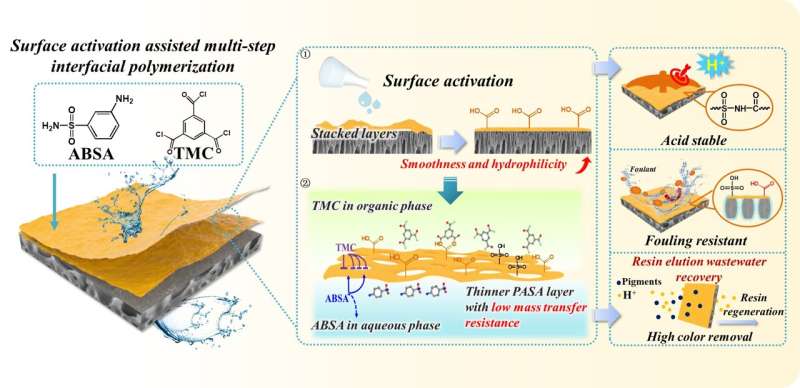
Schematic mechanism of preparation of acid-resistant nanofiltration membrane and its superior separation performance. Credit: CAO Yang
A research group led by Prof. Wan Yinhua from the Institute of Process Engineering (IPE) of the Chinese Academy of Sciences developed a novel highly permeable acid-resistant nanofiltration (NF) membrane for efficient acidic wastewater treatment.
The study was published in Chemical Engineering Journal on August 14.
NF is an energy-saving and environmental-friendly separation technology for treating industrial wastewater. However, most commercially available polyamide NF membranes exhibit low stability in strongly acid solutions due to hydrolysis of the amide linkage.
In this study, the researchers prepared an acid-resistant NF membrane with tunable separation layer properties based on a simple surface activation-assisted, multi-step interfacial polymerization (IP) process.
In the strategy, a novel and low-cost aqueous monomer (3-aminobenzenesulfonamide, ABSA) was used to react with trimesoyl chloride (TMC) to prepare a poly(amide-sulfonamide) (PASA) intermediate layer, followed by the surface activation, and finally a defective-free PASA top layer was constructed on the interlayer.
The stable sulfonamide structure of ABSA could prevent the direct attack of acid. Importantly, with the increase of stacked PASA layers, the membrane showed better continuity and higher selectivity, mainly because the higher amount of monomers could accelerate the IP process and inhibit the excessive reaction between ABSA and TMC.
Interestingly, due to the hydrolysis of the nascent PASA layer during surface activation process, the activated PASA intermediate layer showed increased surface hydrophilicity, smoothness and electronegativity, which could promote the subsequent IP reactions to form a defect-free separation layer with higher permeability and salt rejections.
Benefiting from the strong size exclusion effect, the membrane exhibited desirable dye rejection under acidic conditions as well as acceptable decolorization efficiency of the real resin elution wastewater. Moreover, it also showed excellent acid resistance as well as satisfactory antifouling performance and long-term stability.
"This work provides a low-cost strategy to increase the permeability and antifouling ability of the acid-resistant NF membrane. It is promising to be applied in acidic wastewater treatment in textile and food processing industries," said Prof. Luo Jianquan from IPE, the corresponding author of the study.
 Search
Search




 京公网安备110402500047号
京公网安备110402500047号